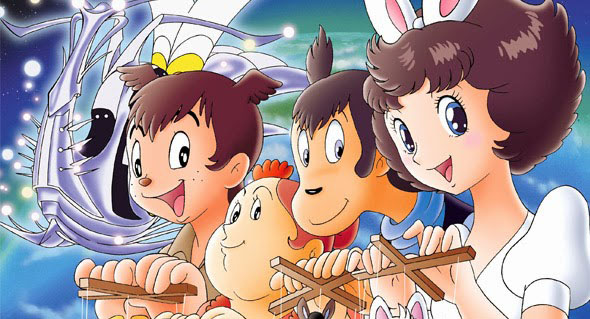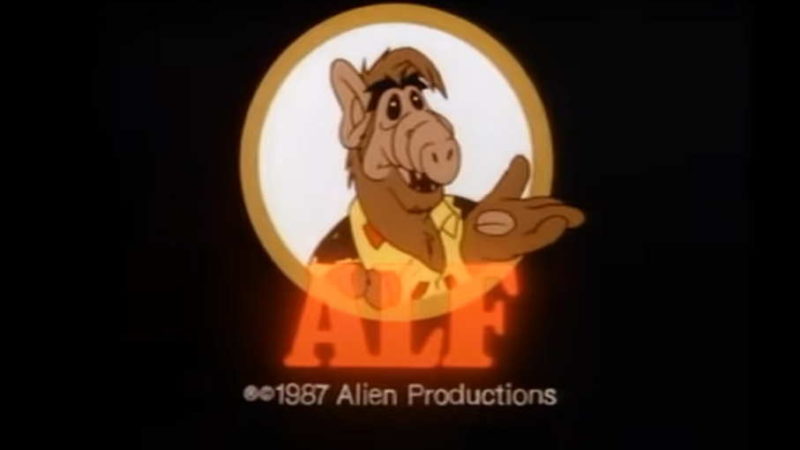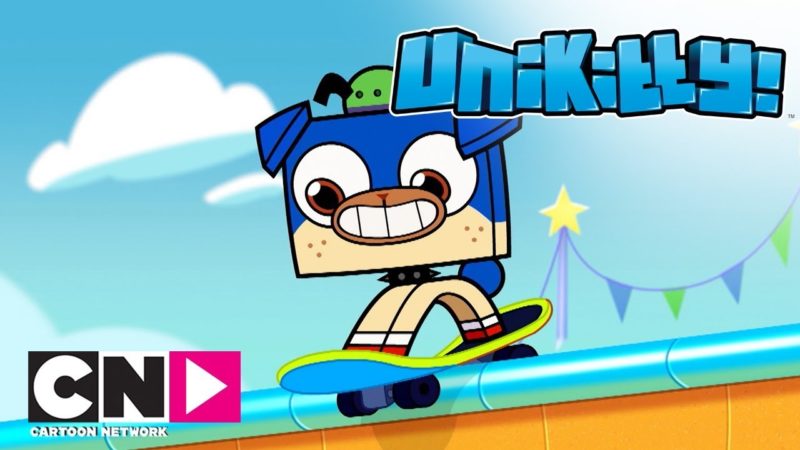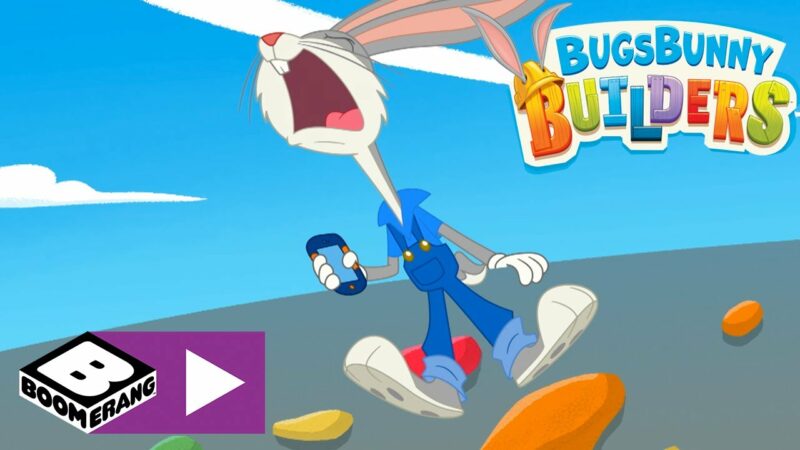Charlie - Dogs go to heaven too - The animated film
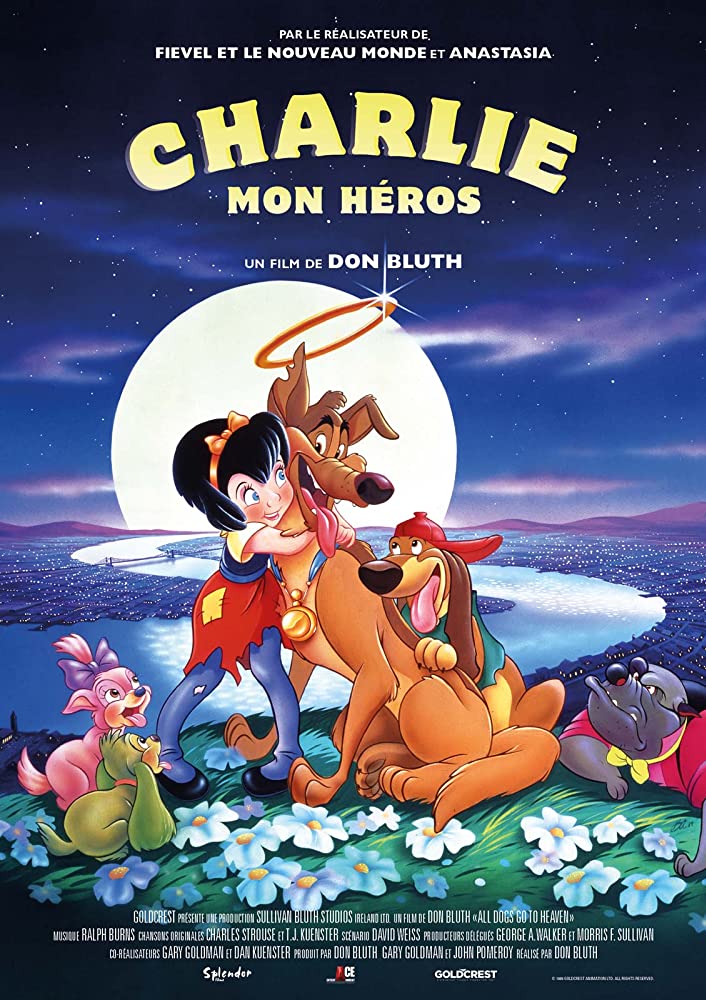
Charlie - Dogs go to heaven too (All Dogs Go to Heaven in the American original) is an animated film on the adventure, comedy, fantasy and genre 1989 musical, directed by Don Bluth and co-directed by Gary Goldman and Dan Kuenster. The film tells the story of Charlie B. Barkin, a German shepherd who is killed by his former friend, Carface Carruthers, but who leaves his place in Heaven to return to Earth, where his best friend, Itchy Itchiford, still lives. The two team up with a young orphan named Anne-Marie, who teaches them an important lesson in kindness, friendship and love.
The film is an Irish, British and American co-production, produced by Goldcrest Films and Sullivan Bluth Studios Ireland Ltd. On the day of its first theatrical release, the film is in direct competition with the famous film "The little Mermaid”Of Walt Disney Feature Animation. While it did not repeat the box office success of Sullivan Bluth's previous feature films, Fievel sbarca in America e The Land Before Time , had some success in home video, becoming one of the best-selling VHS releases ever.
The story of Charlie - Dogs go to heaven too

In 1939 in New Orleans, street dog German shepherd Charlie B. Barkin, a professional thief and his best friend the dachshund Itchy Itchiford, escape from the kennel and return to their underground gambling den on the bayou, formerly run by Charlie himself and his partner. in business, Carface Caruthers. Refusing to share the profits with Charlie, Carface convinces Charlie to leave town with half of the casino's earnings.
Charlie goes to Heaven



Charlie agrees, but is later intoxicated and killed by a car pushed downhill by Carface and his assistant, Killer. Charlie goes to heaven despite not doing any good deeds in life. A dog angel (whippet breed) explains to him that since dogs are inherently good and loyal, they all have a right to heaven. Charlie cheats death by stealing a gold pocket watch, which represents his life and sending it back. As Charlie descends back to Earth, the whippet angel tells him that he can never go back to Heaven and that when the clock stops again, he will be sent to Hell. However, as long as the clock continues to run, Charlie will be immortal.
Charlie meets Anne-Marie
After Charlie reunites with Itchy and plots revenge in the form of a rival criminal activity, they discover that Carface has kidnapped a young orphan girl named Anne-Marie, for her ability to talk to animals, which is advantageous when you bet on the races. Charlie rescues her and promises to feed the poor and help her find a family. The next day on the track, Charlie steals a couple's wallet while they talk to Anne-Marie. Charlie and Itchy use their winnings to build a successful casino in the landfill where they live.
The contrasts between Anne-Marie and Charlie



Anne-Marie, realizing that she has been used, threatens to leave. To get her to stay, Charlie brings pizza to a family of poor puppies and their mother, Flo, in the old abandoned church. While there, Anne-Marie gets mad at Charlie for stealing the wallet. While Charlie has a nightmare in which he is sentenced to Hell, Anne-Marie returns the wallet to the couple, Kate and Harold. As they privately discuss her adoption, Charlie arrives and convinces her to leave with him. Charlie and Anne-Marie narrowly escape an ambush by Carface and Killer and hide in an abandoned building, but the floor breaks and they fall into the lair of King Gator, a giant effeminate alligator. He is as fond of music as Charlie, so he lets them go, but Anne-Marie falls ill with pneumonia.
Carface destroy the casino
Carface and his thugs destroy Charlie's casino and attack Itchy, who, injured, limps back to the church and confronts Charlie jealous for his friendship with Anne-Marie. In his exasperation, Charlie loudly proclaims that he is using her and that he will eventually "dump her in an orphanage." Anne-Marie overhears the conversation and runs away in tears before being kidnapped by Carface. Charlie follows them to the Carface casino, where she is ambushed by Carface and his thugs against him. A battle ensues with Charlie, where oil is inadvertently set on fire, which in a short time envelops the entire building. Charlie's painful howls from their bites summon King Gator, who chases and devours Carface. In the chaos, both Anne-Marie and the watch fall into the water.
Charlie saves Anne-Marie
Unable to save both of them at the same time, Charlie rescues Anne-Marie and places her on a floating piece of wood and pushes her to safety; however, the clock stops before she can reach him, ending her life, so Killer finishes pushing her ashore, where Kate and Harold are waiting with the police and medical staff. Some time later, Kate and Harold adopt Anne-Marie, who also adopted Itchy. Charlie, after sacrificing himself to save Anne-Marie, has regained his place in heaven and is allowed to return as a ghost, to reconcile with Anne-Marie. Leaving Itchy in his care, Charlie returns to heaven, where Carface finally arrives and takes his watch, vowing revenge on the King Gator. As the whippet angel chases him and warns him not to use it, Charlie assures the audience that he will "come back" before blinking and recovering his halo.



DVD release
Charlie - Dogs go to heaven too (All Dogs Go to Heaven) è was released on DVD on November 17, 1998 and as an MGM Kids edition on March 6, 2001. It had a double feature film on DVD with its sequel on March 14, 2006 and January 18, 2011. The film was released in high definition for the first time. on Blu-ray on March 29, 2011, with no special features except the original cinematic trailer.
Technical data
Original title All Dogs Go to Heaven
Country United States of America, Ireland, United Kingdom
Year 1989
Duration 85 min
Gender animation, comedy, dramatic, fantastic, musical
Regia Don Bluth, Dan Kuenster, Gary Goldman
Subject Don Bluth, Ken Cromar, Gary Goldman, Larry Leker, Linda Miller, Monica Parker, John Pomeroy, Guy Shulman, David J. Steinberg, David N. Weiss
Film script David N. Weiss
Producer Don Bluth, Gary Goldman, John Pomeroy
Executive producer George Walker, Morris F. Sullivan
Production house Sullivan Bluth Studios, Goldcest Films
Editor John K. Carr, Lisa Dorney
Music Ralph Burns
Original voice actors and characters
Burt Reynolds: Charlie B. Barkin
Dom DeLuise: Itchy Itchiford
Daryl Gilley: dog catcher
Candy Devine: Edge
Charles Nelson Reilly: Killer
Vic Tayback: Carface Caruthers
Melba Moore: Annabelle
Judith Barsi: Anne-Marie
Rob Fuller: Harold
Earleen Carey: Kate
Anna Manahan: Stella Dallas
Nigel Pegram: Sir Reginald
Loni Anderson: Flo's
Ken Page: King Gator
Godfrey Quigley: terrier
Jay Stevens: mastiff
Italian voice actors and characters
Pino Collizzi: Charlie B. Barkin
George Lopez: Itchy Itchiford
Glauco Honored: Carface Caruthers
Scarlett Izzo: Annabelle
Myriam Catania: Anne-Marie
Danilo DeGirolamo: King Gator
Production
The first idea for the film was conceived by Don Bluth, after finishing work on Brisby and the secret of NIMH . The film was originally about a canine private investigator and one of the three short stories that made up an anthology film. The character of a German Shepherd was specially designed for Burt Reynolds. However, Bluth's first studio, Don Bluth Productions, was going through a period of financial hardship, eventually having to file for bankruptcy, and the idea never got beyond rough storyboards. The concept was taken up by Bluth, John Pomeroy and Gary Goldman and rewritten by David N. Weiss, collaborating with the producers from October to December 1987. They built around the title All dogs go to heaven and have drawn inspiration from films such as It is a wonderful life , Little Miss Marker e A Guy Named Joe . The title of the film came from a book read in Bluth's fourth-grade class, and he resisted suggestions to change it, saying he liked how "provocative" it sounded and how people reacted only to the title.
During the production of their previous feature, Sullivan Bluth Studios had moved from Van Nuys, California to a state-of-the-art studio in Dublin, Ireland, and the film was the first to begin production entirely at the Irish studio. It was also their first to be funded from sources outside of Hollywood, the two previous films, Fievel sbarca in America e The Land Before Time , had been supported by Amblin Entertainment and Universal Pictures, and executive producers Steven Spielberg and George Lucas exercised some control over the content of the films, a situation Bluth found unpleasant. The studio found an investment from UK-based Goldcrest Films in a $ 70 million deal to produce three animated feature films (albeit only two, Rock-a-Doodle and it, have been completed under the agreement). The studio's three founding members, Bluth, Pomeroy and Goldman, had all moved to Ireland to set up the new facility, but during the film's production, John Pomeroy returned to the United States to direct a satellite studio that provided some of the film's animations. . Pomeroy also used his presence in the United States to generate the first publicity for the film, including a presentation at 1987 San Diego Comic-Con.
As production neared completion, the studio held test screenings and decided some scenes were too intense for younger viewers. Writer and producer Pomeroy has decided to shorten Charlie's nightmare of being convicted. Co-director Gary Goldman also accepted the cut, acknowledging that the concession was to be made in the name of commercial appeal. Don Bluth owned a private 35mm print of the film with the cutscenes and planned to get Goldcrest Films to release a portion of the director's film after returning from Ireland in the mid-90s, but the print was ultimately stolen from Bluth's locked closet, diminishing the hope that this version could be published in the domestic media.
The soundtrack
The music of Charlie - Dogs go to heaven too (All Dogs Go to Heaven in the American original) is It was composed by Ralph Burns with lyrics by Charles Strouse, TJ Kuenster, Joel Hirschhorn and Al Kasha. An official soundtrack was released on July 1, 1989 by Curb Records on audio cassette and CD containing 13 tracks, including seven vocal songs performed by various cast members. The theme of the credits and the theme of the film "Love Survives" was dedicated to the voice actress of Anne-Marie Judith Barsi, who was killed by her father, József, along with her mother, Maria, before the release of the film on July 25, 1988.
The judgment of the critics
Charlie - Dogs go to heaven too (All Dogs Go to Heaven in the American original) received mostly mixed reviews from critics, maintaining a 44% approval rating on Rotten Tomatoes based on 17 reviews, and a 50 out of 100 rating from Metacritic. Reviewers often made unfavorable comparisons with The little Mermaid , criticizing the disjointed storytelling, quality of animation and songs of Charlie Strouse and TJ Kuenster. The film received a "thumbs down" from Gene Siskel and a "thumbs up" from Roger Ebert in a 1989 episode of their TV show. At the movies. While Siskel found him "surprisingly weak" given director Don Bluth's previous work, mainly due to his "confusing story" and "unnecessarily violent" scenes, Ebert was a huge fan of the film's "rubbery and supple" animation, claiming it was a good movie even though it wasn't an "animation classic".
Some have even found the darker subject material questionable in a family film, given the film's depictions of death, violence, theft, alcoholism, smoking, gambling, murder, demons, and images of hell. Other reviews have been mostly positive, with critics praising the film's emotional qualities, humor, and vibrant color palette. Roger Ebert, who was not impressed with Bluth's previous film Fievel sbarca in America , gave it three out of four stars, noting that animation "allows such a voluptuous use of color that the film is an invigorating bath for the eyes" and even though it preferred The little Mermaid, which came out the same day, has yet to find Charlie "Brilliant and original". However, film critic Leonard Maltin awarded him one and a half stars out of four, due to "unattractive characters, confusing storytelling and forgettable songs". Common Sense Media is concerned about depictions of illegal drug use and excessive thematic elements, which are plotted into a family film.
As much as Charlie earned, dogs go to heaven too
Dissatisfied with the deadlines imposed by Universal Studios, which had distributed their two previous films, the studio found an alternative distributor in United Artists. Somewhat unusually, the investors of the Goldcrest Films production covered the cost of the prints and promotional campaign, in exchange for a significantly reduced distribution fee from UA. This was similar to the deal with United Artists when they released Bluth's first feature film, Brisby and the secret of NIMH . Goldcrest Films invested $ 15 million in printing and promoting the film. Due to contractual problems, the theatrical release of the film was accompanied by very few items and gadgets; an adaptation of a computer game was released for the Commodore Amiga system (with a free software package) and the restaurant chain Wendy offered Charlie's toys, along with their regular children's meals or fries.
The film was released in North America on November 17, 1989, the same day as the 28th Disney animated film The little Mermaid ; once again, Sullivan Bluth Studios' latest feature would be vying for box office receipts with that of Disney, just like their latest two films ( Fievel sbarca in America e The Land Before Time ). At the time of its theatrical release, while maintaining the $ 13,8 million budget, the film's performance fell short of Sullivan Bluth Studios' previous box office hits, grossing $ 27 million in North America alone, just over the half of what they collected Fievel sbarca in America e The Land Before Time .
Awards and acknowledgments.
Charlie - Dogs go to heaven too (All Dogs Go to Heaven) ha received a nomination for "Best Family Movie: Adventure or Cartoon" at the XNUMXth Annual Youth in Film Awards, having been beaten by The little Mermaid of Disney. The home video release received an Award of Excellence from the Film Advisory Board.


